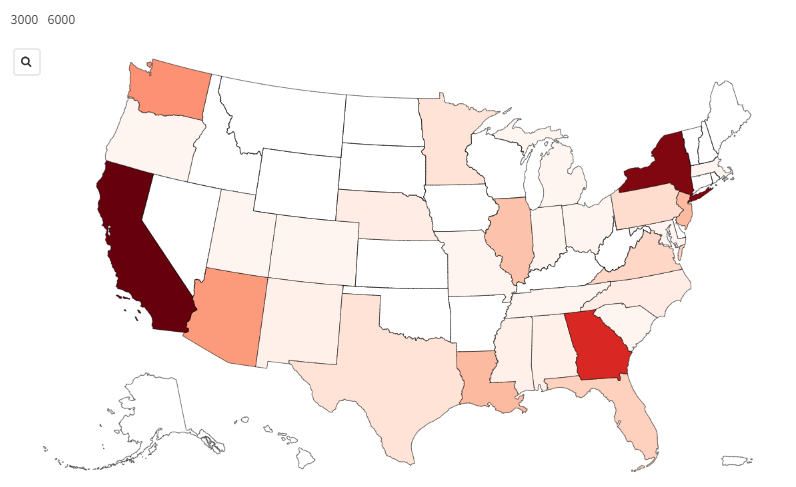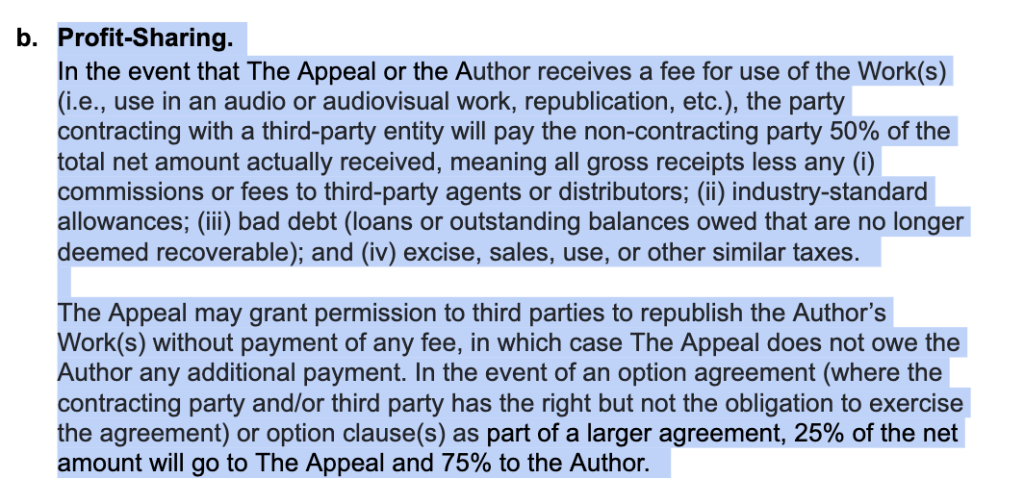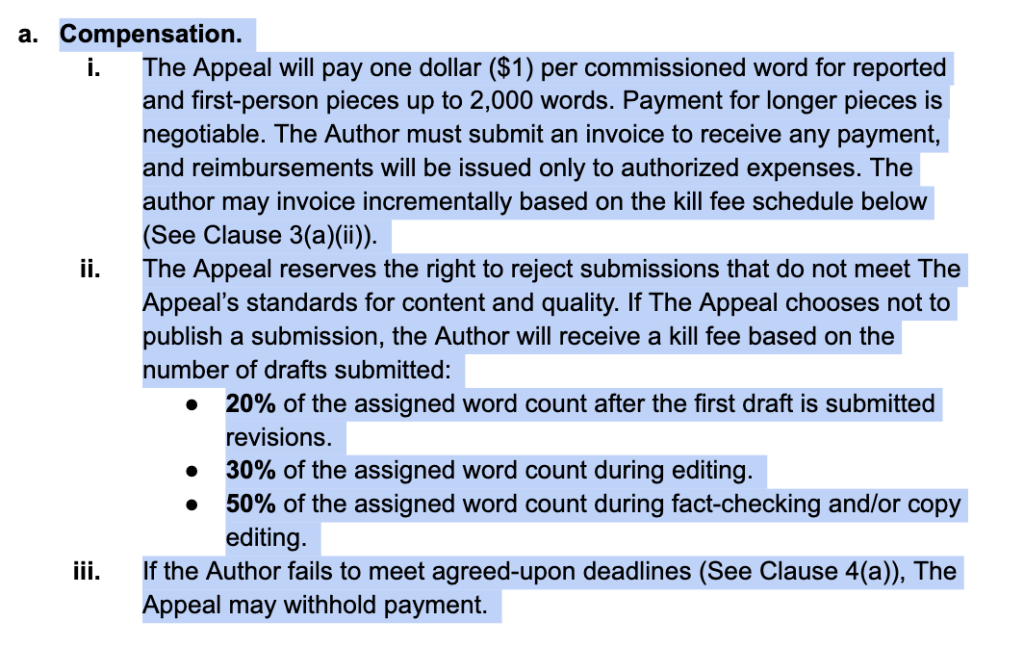
Photo: Daniel Plank | Unsplash
Rethinking best practices for working with freelancers
Extending organizational values to your freelance relationships
The views expressed in this column are those of the author and do not necessarily reflect the views of the Reynolds Journalism Institute or the University of Missouri.
Last month we shared The Appeal’s approach to working with incarcerated writers, whose contributions are essential to our newsroom’s mission of centering voices most impacted by the criminal legal system. This month, we’re talking about working with freelancers, who are equally as important to rooting our journalism in the communities we are reporting on.
Because the criminal legal system operates primarily at the local and state levels, The Appeal takes a multi-local approach to our journalism, covering issues that impact local communities and elevating experts and impacted individuals on the ground. But we are a small team with only two full-time reporters, so we rely on the expertise of freelancers to ensure we are covering stories across the country. In fact, we intentionally track the demographics of our freelance writers to ensure we work with freelancers who represent the communities we are reporting on. In 2022, 32% of our freelance writers were BIPOC and this grew in 2023 to 43%. Soon, we will launch a freelancer survey to better track their geographic location and expertise.

When we relaunched, we knew we wanted to extend our values of equity, transparency, and care to how we worked with freelancers. Specifically, we didn’t want to continue historical patterns of leaving freelancers underpaid, unprotected, and their financial stability left to the whims of an editorial calendar.
Most of our team has freelanced at some point in their careers and been asked to write stories on spec, had pitches stolen, or had to haggle to get paid the money they were owed months late. In a perfect world, we would love to hire many more staff journalists across the country, but adding salaries and benefits to our budget was (and still is) out of reach.
So we set out, as we have done with most things, to intentionally engage freelancers in the most equitable way possible. This meant looking at both our contracts and our editorial process to make sure we were centering our freelancers in both. Here’s how you can do the same:
Draft equitable freelance contracts
We were fortunate to connect with Georgetown Law School’s Intellectual Property and Information Policy Clinic early on, who helped us draft industry-leading standards to avoid financially burdening freelancers and ensure that they maintain rights to their work product.
We looked at three main things:
- Make contracts legible and accessible. We have all signed contracts too dense and legalistic to actually read, and most of us have had at least one experience where that backfired. Opaque contracts are often used as a way to take advantage of people, and freelance contracts are no exception.
By drafting contracts that are clear, concise, and written in plain language, you communicate to freelancers that their understanding of the agreement you are entering into is important to you. A few tips:
- Reconsider whether certain stand-alone clauses are necessary. Are there any clauses that can be taken out, incorporated into a broader clause, or incorporated into your copyright policies?
- Excise as much legalese as possible. Almost all jargon can be swapped out for everyday language that you don’t need a law degree to decipher.
- Help folks understand what they are agreeing to. Provide an informational one-pager you send along with the contract that equips freelancers with the information they need to protect and use their work as a copyright owner.
You can view our contract and freelancer resource guide here.
- Give ownership of intellectual property rights. The majority of freelance contracts we’ve seen allow outlets to own freelancer’s work. When we dug into how we felt about this, we realized it is neither fair nor necessary. When you produce journalism in your capacity as an employee, with a salary and benefits and all the protections that entails, it’s one thing for your employer to own the rights to your work. But when you are a freelancer with none of those things, your work is your currency.
At The Appeal, our contract specifies we have exclusive worldwide rights for the first 90 days from publication. Our freelancers keep their copyrights, and we’re able to keep their work available for republication via a Creative Commons license.
By allowing freelancers to retain the rights to their work and granting your outlet the necessary licenses you need to publish and control the use of their work, you allow freelancers to be involved in and gain from any opportunities for derivative uses of the work (podcasts, movies, books, etc.) that arise.
Here’s our profit-sharing provision, as an example:

Some other tips to consider:
- Ask an intellectual property lawyer for help—and get a second opinion! Some lawyers are more risk-averse and conservative than others, but the right lawyers will help you make sure you are protecting your outlet and your freelancers at the same time.
- Consider your options. Do you want a standard contract that will work for all people? Do you want a flexible contract that allows freelancers to negotiate on a case-by-case basis? How important is it for your outlet to be involved in or control derivatives?
- Think about your copyright policy more broadly. How does your agreement with freelancers interact with your republication and co-publication processes?
3. Pay sooner. Waiting for a publisher’s paycheck is hard enough without the certainty of when it will actually arrive. Unfortunately, this is a common experience for freelancers. An article gets caught up in fact-checking, publication schedules change, new developments arise in the story, and all of a sudden a freelancer is waiting months to get paid. Meanwhile, rent and bills wait for nothing.
By developing incremental pay schedules you can allow your freelancers to get paid for their work more promptly while still protecting your newsroom from paying in full for articles before they get published.
Our compensation provision states:

A couple of tips:
- Think about what is feasible for your finance/HR folks. While paying freelancers on time is super important, more opportunities to submit invoices means more invoices that need to be paid on time. What systems could work for both your operations staff and freelancers?
- Think about your kill fees. Does your pay schedule commit you to more than you would pay if you decide not to publish your story? How might you need to adapt kill fees as a result?
Prioritize freelancers’ needs in your editorial process
Given how vital freelancers are to our multi-local approach, we don’t just want to offer great policies on paper. It is important to us that The Appeal continues to be a publication freelancers are excited to pitch and publish with. This is why we didn’t just draft new freelance contracts when we relaunched, but also overhauled our commissioning process.
By designing an editorial process that accommodates freelance needs and making sure writers feel valued and involved in the publication of their stories, you can maximize your newsroom’s attractiveness to freelancers. Some tips:
- Be upfront. What information can you put on your site about your pitching process that will answer freelancers’ questions and remove potential headaches for you later? The Appeal’s pitching guide not only tells freelancers which email to pitch, but tells them which verticals and geographic regions we’re prioritizing, our pay rate, and when payments are processed.
- Recognize time is money. Be cognizant of how much time it takes to go back and forth to decide on the framing of a pitch. Will jumping on a phone call save multiple emails for refining a pitch?
- Limit how much work you are asking someone to do for free. While it is important to make sure articles fit your outlet’s voice, avoid asking for pieces on spec. If you’re not sure you want to publish this writer, you might be both better served if you say no upfront.
- Create simple systems. Too often clunky systems lead to unsigned contracts, uncollected W9s, and missing invoices. Think about what would be the simplest process for your freelancers. When commissioning, we direct freelancers to a webpage that lays out this process and use HelloSign to capture contracts seamlessly.
- Communicate clearly and often. Making sure expectations, deadlines, and processes are clear helps cut down on excessive back-and-forth, publishing delays, and other hiccups that come up when folks aren’t on the same page. When we commission a story, we don’t just share the word count and deadline, we also make clear what our fact-checking process and standards are so nobody is caught blindsided late in the process.
- Listen to feedback. By building good relationships with freelancers, we created an environment that allows our writers to feel comfortable letting us know when things aren’t working for them. Some of the best changes to our process came from freelancers communicating their challenges.
Cite this article
Greene, Molly and Chan, Tara Francis (2024, May 20). Rethinking best practices for working with freelancers. Reynolds Journalism Institute. Retrieved from: https://rjionline.org/news/rethinking-best-practices-for-working-with-freelancers/

